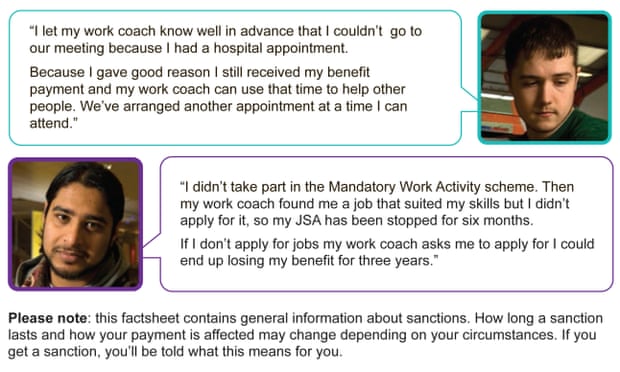More than 80 people a month are now dying after being declared ‘fit for
work’. The safety net that used to be there for the most vulnerable is
being torn to shreds.
Go to your local benefits office and desperation can be boiled down to a six-point plan, mounted on
pink laminated card.
The Department for Work and Pensions (DWP) has assembled written
guidance on suicide for its “frontline staff” – a euphemism for workers
hired to call people and break it to them that they’ve been rejected for
benefits. One section of the guidance – that is to be reported to
managers to alert them of “a suicidal intention” – instructs jobcentre
staff to find out what the person plans, when it is planned for, and
whether “the customer has the means to hand”.
I don’t know at what point social security and a risk of suicide
became inevitable partners. Or when government “supporting people” – as
the
DWP described the guidance this week – began to mean, not helping people build their lives, but checking that they do not want to die.
Death has become a part of
Britain’s benefits system.
That is not hyperbole but the reality that the stress caused by
austerity has led us to. Shredding the safety net – a mix of sanctions,
defective “fit for work” tests, and outright cuts to multiple services –
has meant that benefit claimants are dying; through
suicide,
starvation, and even being
crushed by a refuse lorry when a 17-week benefit sanction forced a man to scavenge in a bin for food.
How can a government have such disregard for death? It is worth looking at how it expects some of us to live...
This morning, the government released
mortality statistics
– or rather, was forced to after several freedom of information
requests – that show more than 80 people a month are dying after being
declared “fit for work”. These are complex figures but early analysis
points to two notable facts. First that
2,380 people
died between December 2011 and February 2014 shortly after being judged
“fit for work” and rejected for the sickness and disability benefit,
Employment and Support Allowance (ESA). We also now know that 7,200
claimants died after being awarded ESA and being placed in the
work-related activity group – by definition, people whom the government
had judged were able to “prepare” to get back to work.
Notably how or why each of these people died was not recorded –
meaning it’s impossible to say whether a death was linked to an
incorrect assessment. But for the government, distortion is key and it
is not restricted to
faked benefit sanction leaflets. If we needed a sign of the DWP’s intentions, as it prepared to release today’s mortality statistics it was seemingly
hedging its bets by finalising the details for a tribunal where it had planned to try to repress some of them.
How can a government have such disregard for death? It is worth
looking at how it expects some of us to live. Until a few months ago in
Bootle, Merseyside, a 48-year-old severely disabled man was
being washed in a paddling pool in his front room.
Rob Tomlinson, who has cerebral palsy, had used a purpose-built walk-in
shower in the specially converted four-bed council house he shared with
his carers, his brother and sister-in law. The bedroom tax saw the
family evicted and until a new property was found a year later, Rob
lived with only a child’s pool and hose to stay clean.
There is a reason, in the age of austerity, that politicians and much
of the media has stopped using the term social security and replaced it
with “welfare”. It sets expectations much lower. A sense of security
for members of society in need bumped down to mere subsistence.
Today’s mortality statistics do not simply point to the death of
disabled, poor, and ill people but of the system that was meant to
protect them. Before our eyes the principle of a benefit system is being
reduced from opportunity, respect, and solidarity to destitution,
degradation and isolation.
Six-point plans to avoid people on benefits killing themselves do not
exist in a society that has hope for their lives. The welfare state was
built on the idea of “the cradle to the grave”. Now for thousands, all
they receive is help to that grave.
guardian.co.uk © Guardian News & Media Limited 2010
Published via the Guardian News Feed plugin for WordPress.

